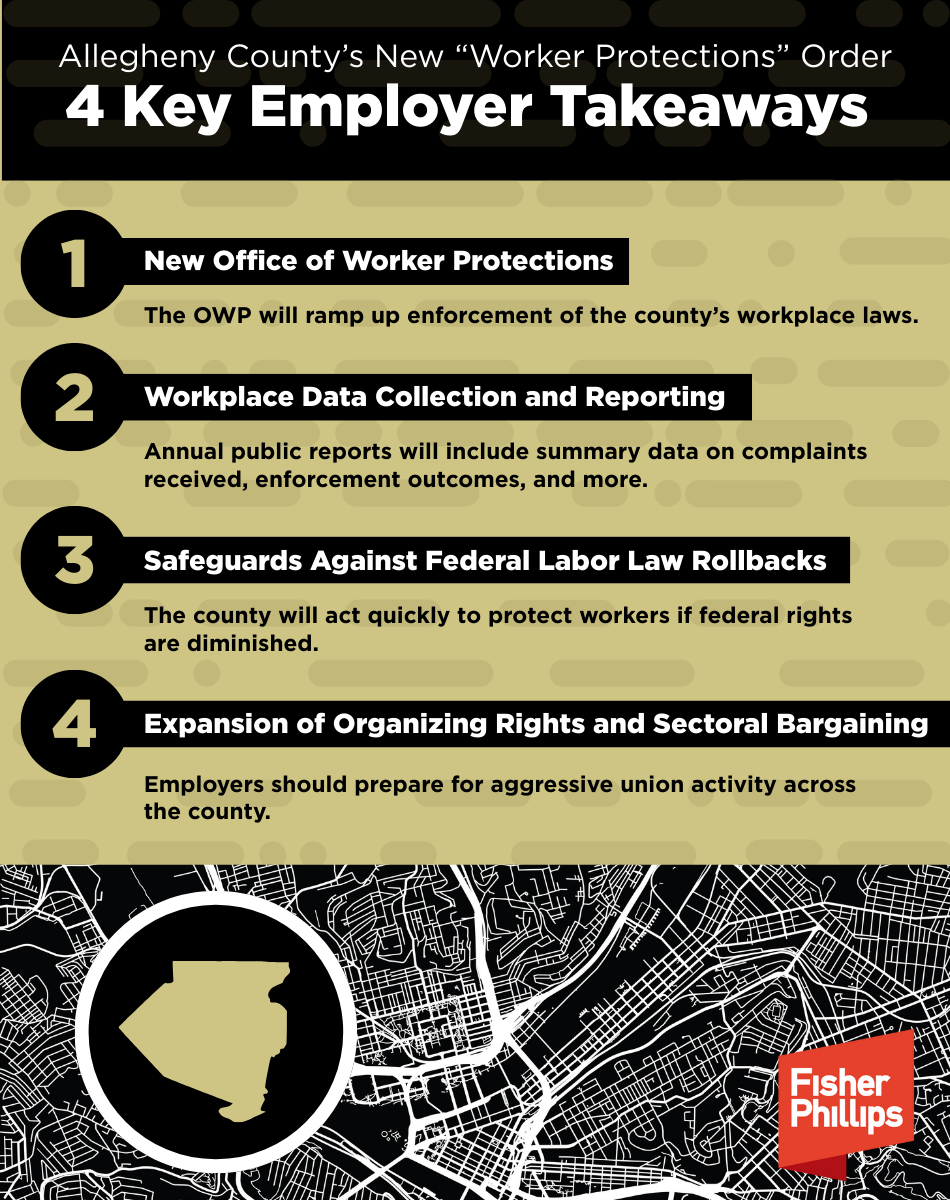Pennsylvania’s Allegheny County, which includes Pittsburgh, is setting up a “Steel Curtain” of worker protections in response to federal deregulatory efforts. County officials issued an executive order just before Labor Day that aims to ramp up enforcement of local workplace laws and expand organizing rights, as well as sectoral bargaining, across the region. We’ll explain how the order impacts private employers and give you four key takeaways.
Quick Overview
Allegheny County Executive Sara Innamorato signed an executive order on August 28 that expands worker protections and aims to ensure that “prosperity is broadly shared, workplaces are safe and fair, and every worker’s dignity is respected.” To accomplish these goals, the county will establish:
- a first-of-its-kind Office of Worker Protections (OWP), which will enforce the county’s “policies, laws, and mandates regarding anti-discrimination, worker protection, workplace benefits, and workplace safety;”
- a new Office of Worker Safety, which will focus on enhancing protections for the county’s employees and contractors; and
- a Best Value Procurement program, which will require responsive bidders to demonstrate a commitment to worker safety and equal opportunity to be rewarded a contract for services with Allegheny County.
The county will also develop an action plan within the next year for not only preserving but also expanding workers’ organizing and collective bargaining rights – which could potentially include the establishment of an Allegheny County Labor Relations Board.
|
Note: Allegheny County is a distinct governmental entity from the City of Pittsburgh, which has its own set of worker protections and enforcement authorities. |
4 Key Takeaways for Employers
1. New Office of Worker Protections Will Ramp Up Enforcement
For the first time, Allegheny County will have a single office dedicated to enforcing the county’s workplace laws. This is significant because, until now, enforcement of certain employment regulations (such as the county’s paid sick leave ordinances) fell under the purview of county departments that juggle a wide range of responsibilities – whereas the OWP will focus solely on enforcing worker protections.
To achieve “widespread compliance,” the OWP will:
- educate workers on their workplace rights and businesses (especially small and mid-size companies) on their employer obligations;
- develop proactive strategies to reach “workers and industries where violations are likely high but workers face barriers to filing complaints,” and build partnerships with community organizations that can reach those workers;
- create a “consistent and rigorous investigatory process” utilizing all of the enforcement tools available to the county; and
- implement an efficient system for handling workers’ complaints.
All employers across the county should prepare for increased enforcement efforts.
2. Workplace Data Collection and Annual Public Reports
The OWP will also document and track complaints received, enforcement actions, proactive outreach, and employment compliance trends – including “identification of repeat violators, high-risk industries, and contractor/subcontractor relationships.” The county will also track demographic, industry, and geographic data “on a voluntary and anonymized basis” to assess any “disparities in labor violations and enforcement outcomes.”
The OWP’s data collection and case management system will involve coordination with relevant county departments, as well as local and state agencies, and the newly formed office will publish an annual public report summarizing the data collected. The new reports aim to ensure transparency and accountability – and create another incentive for employers to stay compliant.
Employers should be aware that the county’s data collection efforts are already underway. Allegheny County recently updated its website to include a “Right to Organize Incident Report Form.” Using this form, employees can now report allegations of union organizing interference directly to the county. Currently, there are no notification procedures to alert an employer that a complaint has been filed. Likewise, there is no means by which an employer can challenge the allegations. While these reports are intended to be “for informational purposes only,” such information could be subject to public disclosure.
|
Note: The county’s data collection and reporting activities must be conducted in compliance with federal, state, and local privacy and civil rights laws. |
3. Safeguards Against Federal Labor Law Rollbacks
Allegheny County is preparing to act quickly if any key provision of the National Labor Relations Act (NLRA) is repealed, invalidated, or otherwise rendered unenforceable. This will involve conducting a study on frameworks, mechanisms, and enforcement tools necessary to preserve for workers the “fundamental right to organize, engage in collective bargaining, and participate in concerted activities for mutual aid and protection.” The county will also consider establishing an Allegheny County Labor Relations Board.
This review will be led by County Manager John Fournier, who will issue a report with recommended courses of action to Innamorato no later than August 28, 2026. Local employers must therefore stay vigilant regarding labor issues, even as the National Labor Relations Board is poised to reshape the law from a much more management-friendly standpoint.
4. Expansion of Organizing Rights and Sectoral Bargaining
The county is not stopping at preserving existing labor law rights – it is also exploring ways to:
- expand organizing rights for workers not currently covered by the NLRA, such as domestic workers, agricultural workers, independent contractors, and workers in emerging industries; and
- allow workers across employers within the same industry or occupation to collectively bargain on wages, benefits, and working conditions.
Fournier will also make recommendations on these initiatives by August 28 next year. With aggressive union activity on Allegheny County’s horizon, employers should consider working with counsel to start developing strategies to stay compliant and maintain union-free status or otherwise manage the challenges the come with a unionized workforce.
Conclusion
We’ll monitor developments in Allegheny County and provide updates as warranted, so make sure you are subscribed to the Fisher Phillips’ Insight System to get the most up-to-date information. If you have any questions, please contact your Fisher Phillips attorney, the authors of this Insight, or any attorney in our Pittsburgh office.




